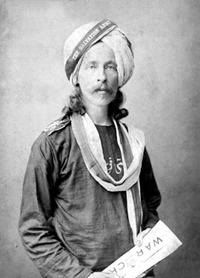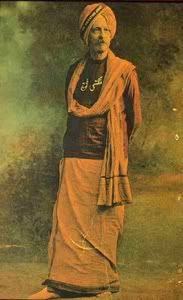
Frederick Tucker was born on the 21st of May, 1853, in the north-east of India. The son of a rich British family, he lived in amongst the Victorian Imperial elite of India. In 1875 he was sent to England to attend Cheltenham College, and was converted during the Moody and Sankey campaigns in London. During the same year, he became engaged to Miss Louisa Mary Bode. In 1877, Tucker (24) and Louisa Mary Bode (42) were married in Amritsar, India.
Frederick served in the Indian Civil Service but in 1881, while on leave in England, he became acquainted with The Salvation Army after reading a copy of The War Cry. He paid General William Booth a visit and expressed his desire to serve in the Army. Tucker received a cool reply from the Founder that he was from the dangerous class of people; Booth however, accepted the offer. Upon his acceptance into The Salvation Army, Tucker gave up his very well paid position, which upset his family, and began working in the legal department at International Headquarters.
In 1882, he led a group of pioneer officers to India, where he became known as ‘Fakir Singh’. This group was accepted because of their incarnational living; the adoption of Indian food, dress, names and customs gave the pioneers ready access to the people, especially in the villages. In addition to purely evangelistic work, various social agencies were inaugurated relieve distress from famine, shortages of food and epidemic. Educational facilities such as elementary, secondary and industrial schools, cottage industries and settlements, were also provided for the depressed classes. His wife Louisa Mary Tucker died in Bombay on 27 February 1887 from cholera. A year later he married Emma Booth and adopted the surname Booth-Tucker. They served together in India until 1891 when Emma also became ill. They soon left Fredericks’ beloved land of India and were appointed to London as Commissioners for Foreign Affairs.
He was successively Territorial Commander in the United States, 1896-1904; Foreign Secretary, in London, 1904-7; Special Commissioner for India and Ceylon, 1907-19; and traveling Commissioner until his retirement in 1924. Emma Booth-Tucker died on 28 October 1903, following a railway accident, and in June 1906 Frederick Booth-Tucker married Colonel Minnie Read. In 1907, The Tuckers sailed for India, where they served for a number of years. This time, Frederick became ill and so in 1919, The Tuckers left India to return to England.
He wrote a number of poems and songs (SASB 422, 780), and compiled a collection of One Hundred Favourite Songs of The Salvation Army, 1899, in the United States. He was the first editor of ‘The Officer’ magazine in 1893, and was the author of several books, including a Life of Catherine Booth, 1892; The Consul, 1903; and Muktifauj 1923 – the story of the first 40 years of the Army in India and Ceylon. He was promoted to Glory – 17 July 1929 Stoke Newington, London and buried at Abney Park Cemetery. Abney Park Cemetery.

(Compiled and edited from the International Heritage Centre Website and The Salvation Army Museum Basel Website)